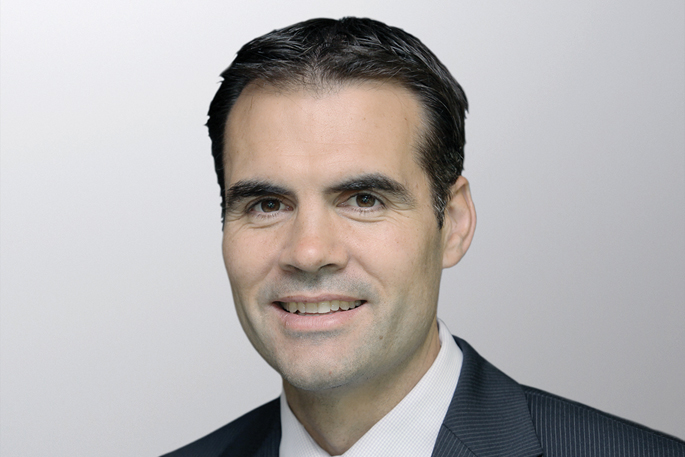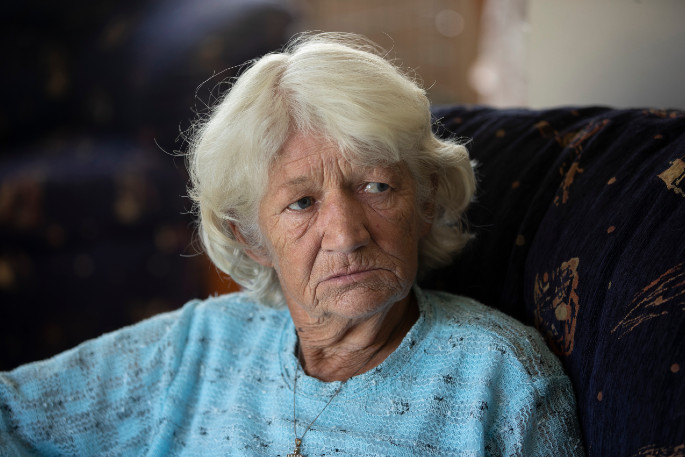Diane Martin loved playing badminton, it kept her fit and active, but now due to cataracts, her eyesight is so blurry she can no longer get out on the court.
It's been more than a year since her last game and the 71-year-old is waiting to be eligible for cataract surgery through the Bay of Plenty District Health Board.
'I don't play badminton anymore because it's [her eyesight] all blurry now so I don't play very well.
'I'm just very frustrated because they tell the elderly to keep moving, yet you can't get surgery done.”
Diane says she can't afford the $4000 fee to have cataract surgery on her left eye done privately.
The lens on her left eye is completely blurry and a cataract is starting on her right, it has gradually gotten worse over the past two years, she says. Despite her impaired vision and the impact it has on her life her eyesight isn't bad enough to qualify her for funded surgery through the BOPDHB.
Diane has been told by her optometrist that if she lived in another region she would already be eligible. She would like to see publicly funded cataract surgery eligibility equal for everyone.
Surgical eligibility is measured through clinical priority assessment criteria (CPAC), which for cataracts assesses a person's vision and the effect it has on their daily life.
Patients are given a score from zero to 100 based on their vision and five questions about how this impacts their lifestyle.
CPAC access thresholds are different at each of the country's 20 district health boards, and are set according to demand and capacity. Cataract CPAC scores range from 45 to 65, according to information provided by the DHBs.
Seven of the 17 DHBs that responded to The Weekend Sun's request for their current cataract CPAC score have an access threshold of 60 or more.
Royal Australian and New Zealand College of Ophthalmologists New Zealand chairperson Peter Hadden says this is creating a ‘postcode lottery' for people's vision and RANZCO would like to see inequity reduced between the regions.
RANZCO is the medical college responsible for the training and professional development of ophthalmologists in Australia and New Zealand.
People's vision is scored with both eyes together so if one eye isn't as bad people will get a lower score making it harder for them to qualify for surgery, says Dr Hadden.

RANZCO New Zealand chairperson Peter Hadden. Supplied image.
Currently, a person must have a CPAC score of 60 before they can have cataract surgery at the BOPDHB.
Waikato DHB also has a score of 60 and Lakes DHB, which covers the Rotorua and Taupo districts has a score of 65.
Dr Hadden says someone with a score of 60 will have bad cataracts in both eyes so 'they're very disabled” from a vison point of view but it also varies depending on how the lifestyle questions are answered.
In comparison, the CPAC score at the Tairawhiti DHB is 45, West Coast and Hawke's Bay DHBs have a score of 48 for cataracts.
Dr Hadden says with a score of 48 a person might be struggling to drive but they would qualify to get at least one eye done.
The Auckland based ophthalmologist says when the CPAC threshold is 60 or higher, surgery is more complicated which compounds the issue of demand and capacity.
'It spirals it because it means that the surgery takes longer, it's harder, so you don't get through as many as many cases.”
BOPDHB acting business leader – anaesthesia, radiology and surgical services Dorothy McKeown says all patients requiring cataract surgery are prioritised using an online national tool and once a patient is accepted and deemed fit for treatment, the maximum wait time is four months.
Dorothy says a specialist will grade all referrals received using the Access Criteria for First Specialist Assessment tool, based on the information received in the referral.
'Due to the demand on the service and capacity to see and treat, access thresholds are in place.
'However, those patients with the most urgent clinical need will be seen first,” she says.
'As referrals are graded based on the information received, if there is any change to a patient's condition we would welcome an updated referral from the GP or Optometrist detailing the changes and the impact on life for the patient.”
In the year from July 1, 2018, to June 30, 2019, 877 people received cataract surgery through the BOPDHB, says Dorothy.
To attempt to combat the ‘postcode lottery', the Government announced sweeping reforms to the health system in April, which will see DHBs replaced by one body, Health NZ, which will instead plan services for the whole population. Health NZ will have four regional divisions but also district offices and there will also be a new Maori Health Authority.
When making the announcement Health Minister Andrew Little said: 'The current system no longer serves our needs well. Our goal is a health system that helps all New Zealanders to live longer in good health."
Dr Hadden says the new system has the potential to reduce disparities between districts and they have been told one of the main reasons for the reforms is to ensure equity of access to services throughout the country.
At the moment there is just a broad outline of what the reforms will look like and it will take time to reduce inequities, he says.
RANZCO want to see the postcode lottery gone but not at the expense of reducing services in communities that are currently well served, says Dr Hadden.
'RANZCO looks forward to continue working with government during the transition period to ensure the best outcomes for patients.”
The new system is expected to come into effect in July 2022.



7 comments
Shame on Ardern
Posted on 08-05-2021 08:04 | By Local Too
Yes with all this money the govt is currently throwing around and yet this lady I in need its a blight on how Ardern is running this country.
cataracts
Posted on 08-05-2021 10:12 | By mlangdon
I can fully relate to this ladies frustration, I am in a similar situation, I have ben diagnosed with cataracts, I have very blurry vision in one eye and have to keep closing that eye to watch TV sometimes, I just recently saw the specialist and he stated that I did not meet the criteria, whilst he did not say in so many words I think he was more than sympathetic but has to abide by the 'system'. Our Health System is seriously 'broken' and the sooner we get rid of these autocratic DHBs making their own rules to the better. So much duplication of services and white collar people sitting in flash offices on big salaries, it is a total nonsense.
$25 for the operation
Posted on 08-05-2021 11:50 | By Centurion
That is what Fred Hollowes was charging for cataract operations he performed in third-world countries. Not a complicated or expensive procedure at all.
AvR
Posted on 08-05-2021 16:15 | By Anton
The poor are going on the waiting list because the rich are done first.
CATARACTS
Posted on 08-05-2021 16:40 | By [email protected]
My husband has the same problem. I now drive him everywhere. Interesting that thanks to Fred Hollows third world countries are better off than we are - not good enough.
Agree with mlangdon
Posted on 08-05-2021 20:00 | By SML
I'm also in the same situation, one eye almost bling and "meets the criteria", the other with cataracts but "not quite at the standard yet", and that's just to get ON the waiting list! I was told they "only do around 900 operations a year in Tauranga", which is ridiculous, with such a high percentage of over-65's that Tauranga is often referred to as "God's waiting room". The "postcode lottery" situation is getting worse and worse, and many are loosing their independance by not getting urgent (and relatively simple) eye operations, and that's not to mention those waiting for hip or knee replacements.
Oh dear
Posted on 09-05-2021 14:43 | By peanuts9
I hope, unlike many others, Diane is still not driving. Too many are.
Leave a Comment
You must be logged in to make a comment.